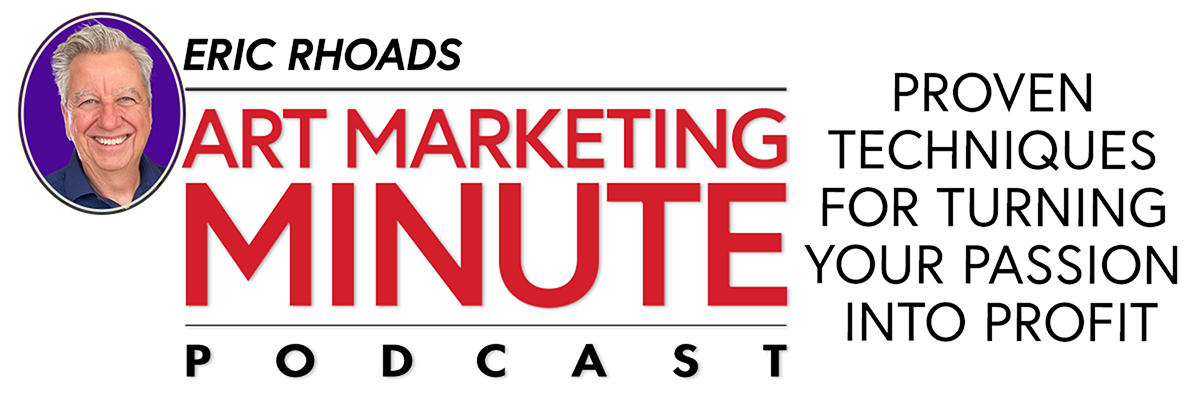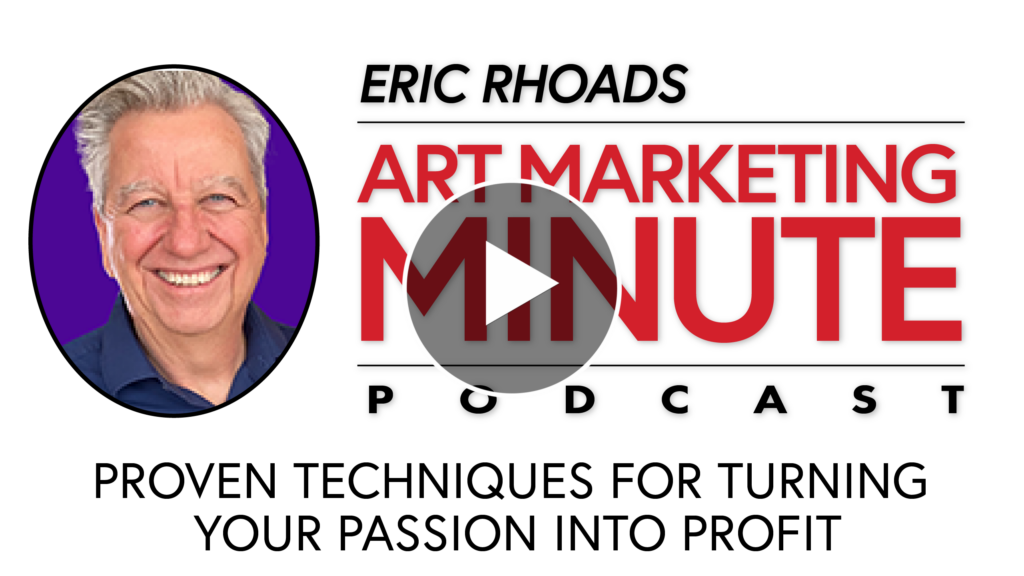Do frames make a difference? How can new grads support themselves as a professional artist? Eric Rhoads answers in this week’s Art Marketing Minute Podcast.
In the Art Marketing Minute Podcast, you’ll learn how to sell your art, how to market your paintings, and everything else you need to know in order to have a successful art career. Each episode answers questions from artists by host Eric Rhoads, author of “Make More Money Selling Your Art,” publisher of several art magazines and newsletters, and author of ArtMarketing.com.
Listen to the Art Marketing Minute Podcast: Episode 87 >
Submit Your Art Marketing Question:
What questions do you have about selling your art? Email Eric today at [email protected] (include your name and where you’re from) to hear your question answered on an upcoming Art Marketing Minute Podcast.
FULL TRANSCRIPT of the Art Marketing Minute:
DISCLAIMER: The following is the output of a transcription from an audio recording of the Art Marketing Minute. Although the transcription is mostly correct, in some cases it is slightly inaccurate due to the recording and/or software transcription.
Announcer:
This is the Art Marketing Minute with Eric Rhoads, author of the Amazon best selling book, “Make More Money Selling Your Art.” In the marketing minute we answer your questions to help your art career brought to you by artmarketing.com, the place to go to learn more about marketing. Now, here’s your host, arts magazine publisher, Eric Rhoads.
Eric Rhoads:
Here is a question from Betty Sue. in Savannah, Georgia. Well, Betty Sue, she says Mr. Rhoads, I’m curious about whether frames really make a difference in selling art. I don’t have a lot of money to spend on frames in my gallery gives me a hard time about the frames I use. What should I do? Well, the first thing Betty Sue is don’t call me Mr. Rhoads, that’s my grandfather. We’re very informal around here. I think what you should do is understand that frames make a big difference if you’re trying to get a big price for a painting and then you put a crummy frame on it. Now there are inexpensive frames that look really elegant. So it’s not necessarily about price. But you got to have a big beautiful frame and framing makes a difference. I remember a gallery in your area actually telling me that he had this painting and hung. It was a beautiful painting. He loved it. It hung in his gallery for about a year it didn’t sell, he was getting ready to send it back to the to the painter, and it had a pretty low price on it was like a $2,000 price. So the guy has sent sent an image off to his frame maker had a beautiful, really expensive gold carved frame made for it very custom. And it costs a lot of money. I don’t know what it costs, but I think I remember him saying it was $5,000 It’s a lot of money for a frame, I get it. But he put that frame on it, it sold the first week for $15,000. framing makes a difference. Great framing makes a difference. I think framing is kind of like cars, people put themselves in nice cars, because they’re like picture frames, right? It’s how they see themselves. If you’ve got somebody who’s paying a lot of money for a painting, they don’t want it in a crummy frame, they want something that’s going to look good around their expensive furniture and around their beautiful expensive house. And it’s got to fit. So you got to you got to know your market. Some galleries are higher end market, some galleries are low in market, I don’t know your market, but framing will help a great frame. If it’s properly done. If it’s properly color matched. And it really stands out, it’s going to compliment the painting and make a huge difference. Now, I know coming up with the money is tough. I remember a discussion with a friend who was doing a major show. And he said I really don’t have the money for the frames. And I said you just gonna have to figure out a way you got to go for it. And he did, he got better frames, and the show sold out. And he said, You know, I think it was the frames that really helped make a huge difference. So keep that in mind.
Next question is from Rachel in Florence, Italy. Cool. Yeah, we have people look at the stats on the podcast. So people all over the world, I mean, people in Iran, and I think that’s very cool. Thank you all for listening, everybody. She says, Hi, I’m an American student living and studying art in Italy. I don’t graduate for two more years. But I want to be selling and supporting myself as soon as I get out. So I want to be thinking about what I should be doing now. Well, Rachel, I think that’s very smart. Because we should all learn to think ahead, you know, our marketing plans, we really, you know, I try to do a marketing plan a whole year out and sometimes two years out. And it’s not always easy, and sometimes it changes. But you need to be thinking about your marketing two years out. And so what can you be doing? Well, first off, you want to be patient, you’ve got to learn what you can learn and you got to get good, that’s the most important thing you can do. Because this time invested will serve you well, what I would do is I would schedule a show of your work to take place in your town or in New York or someplace soon after you get home maybe a couple of months or three months after you get home so you have a little time to work on it. But work towards that show by painting nights and weekends if you’re allowed to or if you can, or if you have the time to and start building a body of work so that you have things that you can put in a show. And that way you have time to find a venue, you have time to get somebody to work with you on it to promote it. And that’s a good way to kind of kick your career off and get some experience in a show. You want to get known. You want to start commenting a lot on Facebook and Instagram, smart commenting, and maybe showing some examples of your work when you comment. Don’t be too over but be smart, be intelligent, and talk a lot about things that you’re learning and that will help get your brand out there. Now, that’s not the only place to do branding, of course, but it’s probably the only thing you can afford right now. You also should be ready for gallery shopping now. The galleries are going to say you’re probably not ready yet, because you still got a couple more years to learn a lot of stuff. But I remember when Katy Whipple hit the market soon after graduating from the Grand Central Academy, Jacob Collins school, she was like a rock star on fire. And she has been on fire ever since. I mean, she’s doing these incredible paintings she’s doing these shows her stuff seems to be selling. And, you know, she, it’s like, people see that and they go, I want a Katy Whipple for my gallery. So you know, you can contact galleries in advance and say, Hey, I’m at this school in Florence. And here’s the kind of things we’re learning. And here’s what I’m working on now. And I’m going to be a whole lot better than this in two more years. And would you consider me in a couple of years and start dialoguing with them now? and have a discussion and maybe by the time as you keep sending them work? They’re like, yeah, yeah, we want it. We want to be associated with this. And you can kind of sell the idea that these students who graduate from these great schools are the ones who are painting all the great work and you want to grab them while you can. So that’s what I would do. There’s probably a lot more stuff you can do. But you you know, you want to build a website. And you want to start gathering names who are of people who are interested, and you want to do what’s called retargeting or remarketing. And that’s the idea that when people visit your website, it collects a pixel so that if you want to put Facebook ads and something in front of them, you can do that. So that’s how that works.
Well, this has been the art marketing minute with me. Eric Rhoads. My goal in life is to eliminate the idea of the starving artist to help your dreams actually come true. So if you want to submit questions, simply email [email protected]. And to learn more about marketing ideas, you can visit Artmarketing.com. Thanks for listening.
How to Submit Your Art Marketing Questions: What questions do you have about selling your art? Email Eric today at [email protected] (include your name and where you’re from) to hear your question answered on an upcoming Art Marketing Minute Podcast.



Great tips as always! I think we all struggle with the frame issue. I was told early on to paint the same size pieces or select two sizes and get a good frame in those sizes. When a painting comes out of one show, use that dram on another painting you are putting in the next show. Until you have enough frames to go around as you make more $$.